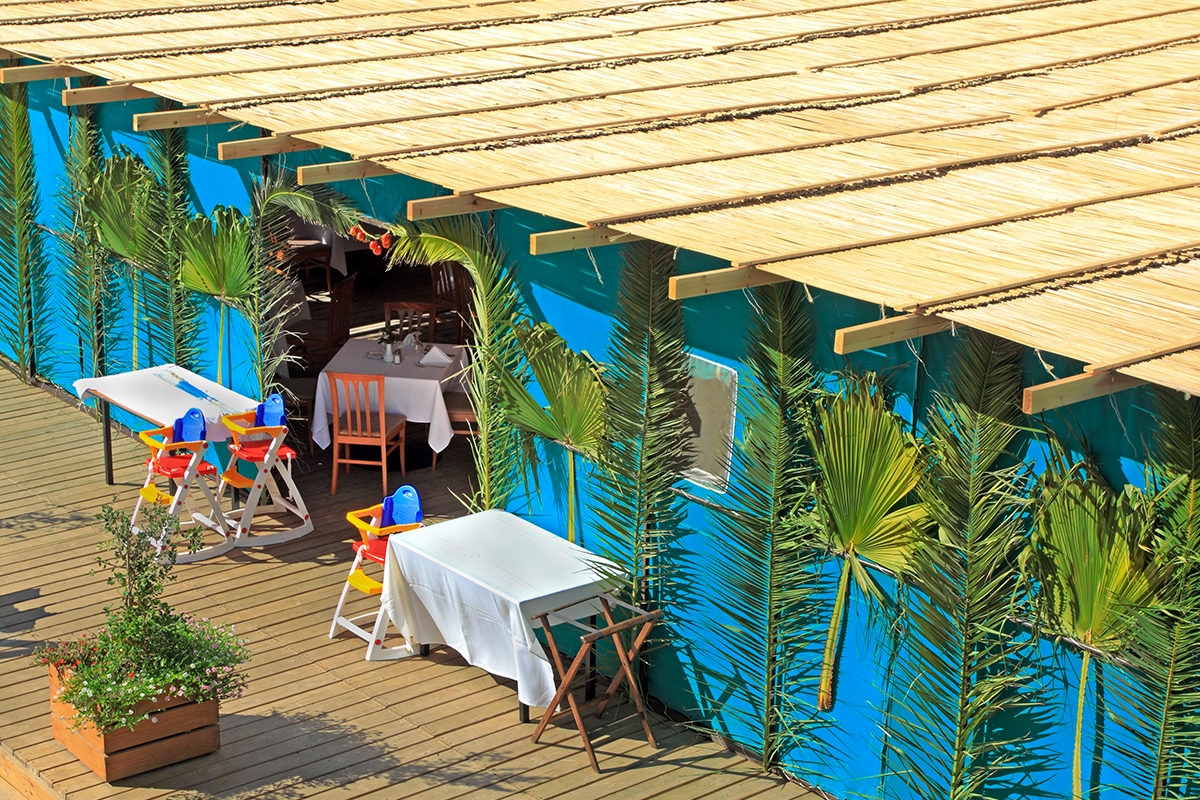Lately, the world has felt like a dark and chaotic place. At night, you fall asleep to news of military attacks in Syria, and in the morning you wake up to images of a mass shooting at a synagogue in Germany, or a shopping center, or a country music concert. On top of all of this is the constant drumbeat of corruption, lies, and hard-heartedness coming from our nation’s capital.
It’s been difficult to focus. It’s been hard to keep up with carpools, homework monitoring, and bedtime routines. My attention keeps slipping away from these mundane tasks, and I find myself dwelling upon the feelings of hopelessness and helplessness that frequently rise up like storm clouds blocking out the sun.
Given this context, the holiday of Sukkot is resonating more deeply than ever with me this year. On this Jewish holiday — which begins on the evening of Sunday, October 9 — we set up a temporary dwelling place outside. The sukkah needs to be solid enough to withstand the weather, but fragile enough to let in the light from the stars and the moon.
My family first took up the tradition of building a sukkah when we moved into our “forever home” 10 years ago. One of the things that attracted us to the house was the latticed deck that seemed to be begging to be converted into a sukkah. Over time, I’ve come to appreciate so many aspects of this holiday. I enjoy the opportunity to be creative — as adults, we don’t often have the opportunity to bring to life something we dream up in our imagination that has no practical purpose. My family’s sukkah fits all of the traditional qualifications, but it also expresses the whimsy and creativity of our family. We are a family that celebrates Shabbat with weekly “dark parties” at which we pass our candy-filled “blessing cup” around the table while listening to our Shabbat playlist on Spotify. Putting our own special twist on ancient traditions is kind of our thing. Our twinkly, sparkly sukkah feels just right to us.
Plus, on Sukkot, I truly enjoy the opportunity to be outside and in nature. I love to drink in the crisp fall days, and look up through leafy branches at the bright blue sky. I savor the dinners eaten outside to the sounds of squirrels scampering up trees and the sight of the sunset illuminating the evening sky.
So yes, I’ve long loved these things about Sukkot. But this year, I’m particularly moved by the mandate to BE HAPPY. It’s true! A nickname for Sukkot is Z’man Simchateinu, which means “the time of our joy.” And I’m so grateful that the harvest festival coming just in time to be a welcome reprieve from feelings of helplessness and despair.
In order to truly fulfill the mitzvah of Sukkot, however, it’s not enough to merely construct a sukkah. You also have to decorate it, and you also have to invite guests. Some years, this feels like a lot of pressure, especially when there are days when just getting everybody to school, work, and an occasional visit to the orthodontist are about all I can manage.
This year, however, it feels like the solution to a deep, deep yearning.
Our world feels increasingly confusing and frightening. Lives are cut short every day by things beyond our control, from catastrophic storms whose effects are magnified by climate change to white supremacists with access to automatic weapons. So many things are outside of our control.
But this year, in the process of fulfilling the mitzvot of this holiday, I’m reminded of all the things that are WITHIN our control. I can create a beautiful, sacred space right in my own backyard. I can carve out the time to eat slow, relaxing meals with family and friends. I can nurture important relationships in the context of this time and space. Above all, I can give myself permission to BE HAPPY.
Sukkot is a reminder to take time each day to create some happiness — enjoy our beautiful, natural world, and revel in the gift of each other. Each day is precious, and the gifts of today might not be here tomorrow. The sukkah itself is a reminder that everything in our lives — both the joy and the tragedies — is temporary.
After harnessing the power of our creativity — by creating beautiful spaces in our backyards — we then fill that space with twinkling lights, good food, laughter, friendship, and love. But that’s not all: We can take all that love, and let it radiate it outward. We can let that love motivate us towards generous and loving acts that help repair our broken world.
Yes, we’ll break down the sukkah when the holiday is over. Still, I’ll carry with me the empowering memories of intentionally creating a time and space for joy, light, and love during these dark times. But that’s not all. Next, I’ll roll up my sleeves and go back to the work of adding my voice and my efforts to fighting the intolerance, inequality, and injustice that is so prevalent in our country right now.
Wishing you all a joyous and peace-filled holiday — and that, by next year, the world is in a better place.
Image via luoman/iStock/Getty Images Plus








